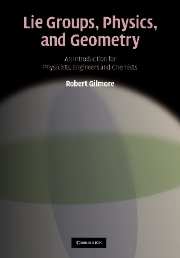Book contents
- Frontmatter
- Contents
- Preface
- 1 Introduction
- 2 Lie groups
- 3 Matrix groups
- 4 Lie algebras
- 5 Matrix algebras
- 6 Operator algebras
- 7 EXPonentiation
- 8 Structure theory for Lie algebras
- 9 Structure theory for simple Lie algebras
- 10 Root spaces and Dynkin diagrams
- 11 Real forms
- 12 Riemannian symmetric spaces
- 13 Contraction
- 14 Hydrogenic atoms
- 15 Maxwell's equations
- 16 Lie groups and differential equations
- Bibliography
- Index
1 - Introduction
Published online by Cambridge University Press: 05 September 2012
- Frontmatter
- Contents
- Preface
- 1 Introduction
- 2 Lie groups
- 3 Matrix groups
- 4 Lie algebras
- 5 Matrix algebras
- 6 Operator algebras
- 7 EXPonentiation
- 8 Structure theory for Lie algebras
- 9 Structure theory for simple Lie algebras
- 10 Root spaces and Dynkin diagrams
- 11 Real forms
- 12 Riemannian symmetric spaces
- 13 Contraction
- 14 Hydrogenic atoms
- 15 Maxwell's equations
- 16 Lie groups and differential equations
- Bibliography
- Index
Summary
Lie groups were initially introduced as a tool to solve or simplify ordinary and partial differential equations. The model for this application was Galois' use of finite groups to solve algebraic equations of degree two, three, and four, and to show that the general polynomial equation of degree greater than four could not be solved by radicals. In this chapter we show how the structure of the finite group that leaves a quadratic, cubic, or quartic equation invariant can be used to develop an algorithm to solve that equation.
The program of Lie
Marius Sophus Lie (1842–1899) embarked on a program that is still not complete, even after a century of active work. This program attempts to use the power of the tool called group theory to solve, or at least simplify, ordinary differential equations.
Earlier in nineteenth century, Évariste Galois (1811–1832) had used group theory to solve algebraic (polynomial) equations that were quadratic, cubic, and quartic. In fact, he did more. He was able to prove that no closed form solution could be constructed for the general quintic (or any higher degree) equation using only the four standard operations of arithmetic (+, −, ×, ÷) as well as extraction of the nth roots of a complex number.
Lie initiated his program on the basis of analogy.
- Type
- Chapter
- Information
- Lie Groups, Physics, and GeometryAn Introduction for Physicists, Engineers and Chemists, pp. 1 - 23Publisher: Cambridge University PressPrint publication year: 2008



